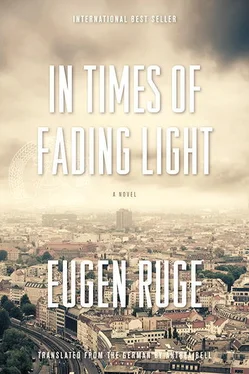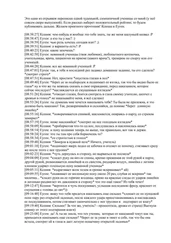“You know… you can buy ready-to-use dumpling mix. Honestly… it’s not so bad… would you like me to write down the brand name?”
Irina snatched the grater out of Catrin’s hand.
“Sorry,” said Catrin. “I didn’t mean to… I mean, just because of all the work.”
Irina said, “I. Will. Do. It.”
Only when Catrin had left the kitchen did Irina notice that she was still holding the big meat knife.
She put the knife away. Propped herself on the sink for a moment. If you breathed right in, it didn’t hurt so much. Irina breathed right in. But now she heard the men’s voices again.
You didn’t serve a long enough sentence, that’s what it is! They ought to have given you another ten years!
The giblets were beginning to dance before her eyes.
You haven’t the faintest idea what capitalism means!
Irina looked at the wall tiles, trying to concentrate on the joins where they met.
Capitalism is murderous, shouted Kurt. Capitalism is poisonous! Capitalism will consume the whole earth…
Irina breathed out again. Sixteen hours, said the radio. This is German Radio, the time is sixteen hours. The Soviet Union was being dissolved for the third time. All the same, she wondered a bit. About the weather.
Eighty million dead, shouted Sasha. Eighty million!
Had that been her? Her hands? Her belly? For the homeland, for Stalin. Shit. If she could only… breathe in all the time.
Two billion, shouted Kurt.
First she tipped the stuff away in the garbage: the potatoes. Then she put the thingummy on. But the bottle was heavy… pick it up in the oven mitt. To the homeland! To Stalin! To everyone who had let her down!
Yes, the children in Africa, bellowed Kurt. What’s so funny about that?
She took the goose out of the oven. Goose, silly goose. There it lay. The stitches had come open, there was a gaping hole. Hurt when she reached into it. Get the mushy stuff out, without oven mitt. The stuffing. Was hot. But never mind… couldn’t be helped. She breathed in. But the giblets were perfectly cold. She took hold of it all. All at once. Stuffed it back in. Silly goose. And still had her hand in it, the cold stuff in her hand, hot outside, cold inside… when everything began sliding. The whole kitchen. The tiles. And dancing. Only now it was the floor tiles.
Catrin took her under the armpits.
“Don’t touch me,” said Irina.
“Irina,” said Catrin.
And then it came out, the dregs. Came out of its own accord. An outcry coming out of its own accord. The tiny bit of dregs, sticking to what she shouted.
“Don’t touch me, you sow!”
Then the floor came closer again. The tiles. Dancing. But the goose lay still. After a while. Lay still on the tiles. Goose, silly goose. With a hole in the middle of it.
“Oh. So that’s it,” said Sasha.
Must stitch it up again, thought Irina.
As always when he came home on Friday at the end of the week, he was the first. As a result he was the one who found the letter with the black border in the post, addressed to Melitta and Markus Umnitzer, although Melitta’s surname had been Greve for the past three years (she had taken Klaus’s name, so Markus was the only Umnitzer in their new so-called family).
He noticed the letter at once because it had such a distinguished look. He didn’t know whether he would be justified in opening it, so he bent it in half and put it in the back pocket of his jeans. He had something more urgent to do first.
He flung his dirty washing down in the bathroom, raced up to his room and unpacked the sound card that he had bought at the computer store in Cottbus. To be on the safe side, he tore up the packaging right away and buried it in the bottom layers of his wastebasket (Muddel thought everything to do with computers was a silly waste of time). Then he opened up the side of his tower PC, which was held in place by a screw as a makeshift, pushed the card into the corresponding slot, linked it by cable (small plug, plugboard) to his stereo amplifier, booted up the computer, and tried the sound card out by playing a round of the DOOM game: wicked! The stertorous roar of the monsters was so real it was scary. You heard the sound of the shotgun being fired and reloaded, the gurgling as the monsters collapsed when they were hit. Markus went up to the next level and then failed several times in tackling a room full of demons from hell; you had to fetch a key from the room to get any further with the game.
All of a sudden it was five thirty. Muddel usually got back from Berlin around six. Now that you couldn’t earn anything with pottery, she was working as a psychiatrist again in the floristic psychology department or whatever it was called (something to do with loopy criminals), and Markus wanted to be gone before she came in. He found food to be warmed up in the fridge, but unfortunately there was also a note beside the stove with a whole list of chores that Muddel wanted him to do. He decided not to touch the food and not to have seen the note beside the stove. He cut two thick slices of bread, put cheese on them, and as he ate the bread and cheese searched his room in vain for the dope that he had stashed away somewhere in the chaos last weekend. Then it was getting dangerously close to six, so he put a bit of gel on his hair and left the house.
Since the fall of the Wall (or at the latest a year or so after it), Grosskrienitz suburban rail station had been brought back into working order. It was less than forty minutes to get to Berlin city center, and less than twenty to the Gropiusstadt district—and Frickel. The funny thing was that Gropiusstadt, which Markus had once admired from a distance, now suddenly turned out to be a rather down-market place to live, while Grosskrienitz had turned into a posh Berlin suburb, and the house that Muddel had once bought on the cheap with East German money had turned out to be a very profitable investment. When Klaus moved in here, they had had it entirely renovated, with a green roof and all the extras. Money was no object, because suddenly Klaus was a politician and sat in the Bundestag—Pastor Klaus, who used to hand out carbon copies of poems in the Grosskrienitz church, was a parliamentary deputy and heaven knows what else, flew to Bonn every Monday and earned pots of money. And Muddel was also earning, had bought herself a silver-gray Audi—while Frickel’s mother was now divorced and unemployed and lived with Frickel in a high-rise apartment building in the Gropiusstadt district.
There was nothing Markus could do about any of that. And personally he had no objection to his mother and stepfather suddenly having money. But Klaus, who had recently taken to being all paternal, was keen for Markus to manage on his apprenticeship allowance, and even docked him some of it if he happened to leave tools lying about in the garden or broke something accidentally, and Muddel thought everything Klaus said was right anyway. She even went to church on Sunday. And she would have liked to make him, Markus, go to church as well, but that could be avoided by referring to the freedom of belief guaranteed by the Basic Law of Germany. On the other hand, it was hard to avoid the “family day” on Sunday, sometimes all of them cooking and eating together, that kind of stuff, or (not so good) all going to an exhibition together—if it didn’t happen to be a day for what they called a family council, cover name for bawling him, Markus, out because he’d failed to do chores of some kind again, or because of the swastika in his room, which had nothing to do with Nazis anyway but came from India, it was Hinduism and so forth, but that sent them into downright hysterics. All of this really got you down, and yet he always had kind of a guilty conscience when he met Frickel, he seemed to himself spoilt and soft, and felt an urge to badmouth life in Grosskrienitz—but talking a lot wasn’t cool, either, so a summary of his week was usually short and pithy:
Читать дальше












